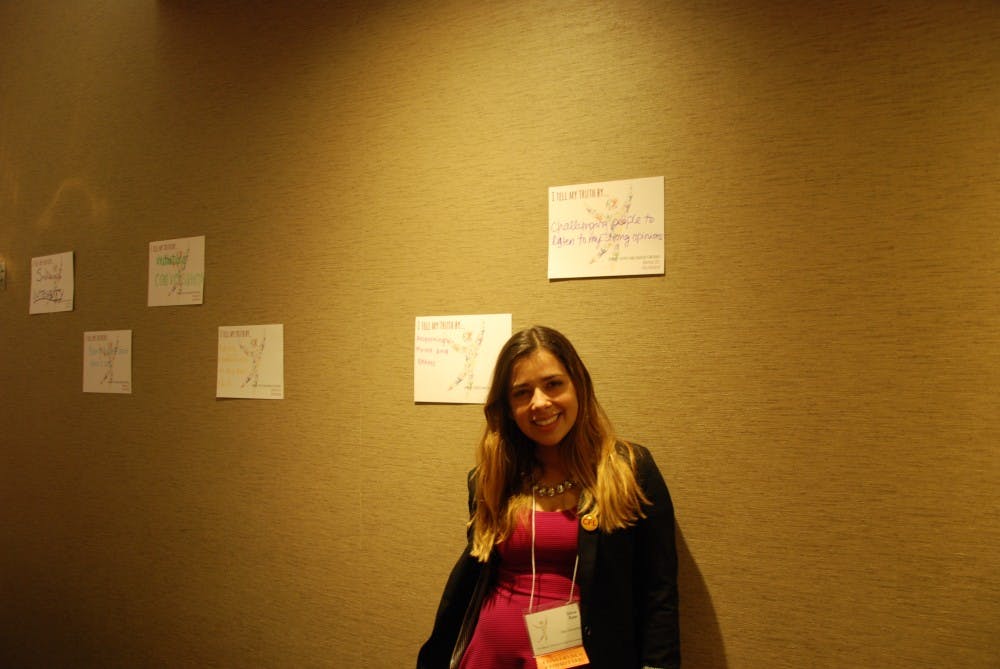Within minutes of sitting down Friday evening, attendees of Elon University's Intersect Diversity and Leadership Conference were back on their feet.
They were challenged by sophomore Olivia Ryan, student director for the Intersect Conference and opening speaker, to introduce themselves to two new people and share the story of how they came to be at the Intersect Conference.
"Tell your truth," Ryan said. "Telling your truth is as simple as meeting someone new."
And it wasn't difficult to find someone new. Thirteen universities across North Carolina and the surrounding states were represented in the crowd of about 200 people from diverse backgrounds and areas of study. The room buzzed as attendees shook hands and shared stories, laughing and talking.
Though, as Dean of Multicultural Affairs Randy Williams Jr. said when he took the podium after Ryan, sometimes it's not so simple to tell your truth.
"There are obvious things that are happening that lead to disharmony and disconnection," he said, specifically referencing recent events at the University of Missouri and Yale University. "Some people aren't able to tell their truths."
That discussion, of how and why some people have the privilege to tell their truth when others don't, followed attendees out the door of McKinnon Hall and through the rest of the day's sessions and speakers.
For example, in a session titled "Navigating Identity and Privilege in Multifaith Engagement," Associate Chaplain for Protestant Life Joel Harter, Muslim Life Coordinator Anna Torres-Zeb, Multifaith and Intern Coordinator Diana Abrahams, senior Margaret Bryant and sophomore Ariel Mittleman talked attendees through the ways privilege manifests itself in modern religious contexts.
The presenters explained that while racial privilege is the topic of much recent conversation, religious privilege is often so engrained in the way U.S. institutions work that it's difficult for Christian students to recognize. Harter provided a recent example of Elon's celebration of Diwali.
"If you are Hindi and want sparklers to celebrate Diwali, you can't get them," he said. "They only sell them for the Fourth of July and New Year's."
As Bryant explained, something as simple and ubiquitous as the school calendar privileges observers of Christianity in the same way that the traditional right-sided classroom desk privileges right-handed students over left-handed students, which struck freshman attendee Marisa Pipino.
"In schools, the Christian religion is targeted for days off, and they have that advantage," she said. "Here at Elon, for Yom Kippur, they had the career fair on that day. People could have possibly skipped their classes to observe — but if you're a junior or a senior, [the career fair] is something that's really helpful. So they had to choose between religion and career."
The topic of privilege was also the theme of Senior Lecturer in Religious Studies L.D. Russell's keynote address.
Russell began by saying he was surprised that as "an older, white, heterosexual male from South Carolina — the poster child for privilege" — he was asked to speak at a diversity conference. But he said there are two sides to privilege.
"Privilege oppresses those who don't have it, but it's a trap for those that have it," he said.
According to Russell, a person in a position of privilege must recognize his or her position and then act on it.
"The idea is not just to reach across that gap, it's to examine that gap," he said.
Russell challenged attendees to take advantage of the conversations about identity and privilege taking place at Elon and elsewhere in the United States right now by having difficult discussions and working to make a change.
"I have never seen as much radical and rapid change, and I lived through the 1960s," he said. "It's a scary moment, but my God, it's exciting. What an opportunity."


